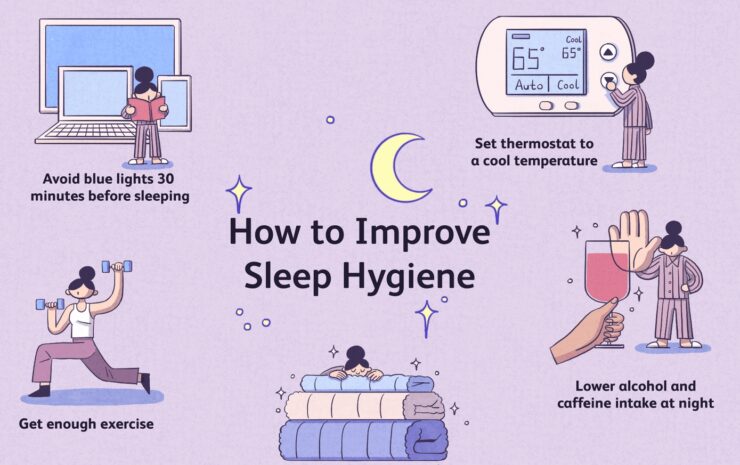In the hustle and bustle of modern life, sleep often takes a backseat in our list of priorities. However, the importance of sleep cannot be overstated. It is as crucial to our well-being as eating, drinking, and breathing. Understanding the significance of sleep and learning how to improve it can lead to enhanced overall health and a better quality of life.
The Vital Role of Sleep
Sleep plays a pivotal role in good health and well-being throughout your life. Getting enough quality sleep at the right times can help protect your mental health, physical health, quality of life, and safety. During sleep, your body is working to support healthy brain function and maintain your physical health. In children and teens, sleep also helps support growth and development.
The damage from sleep deficiency can occur in an instant (such as a car crash), or it can harm you over time. For example, ongoing sleep deficiency can raise your risk for some chronic health problems. It also can affect how well you think, react, work, learn, and get along with others.

Understanding Sleep Cycles
Sleep is not just a time when your body shuts off. While you rest, your brain stays busy, overseeing a wide variety of biological maintenance tasks that keep you running in top condition and prepare you for the day ahead. Without enough hours of restorative sleep, you won’t be able to work, learn, create, and communicate at a level even close to your true potential. Sleep apps are a great way to get insights into your sleep.
The Consequences of Poor Sleep
Regularly skimping on sleep can lead to a variety of health problems, from obesity and heart disease to weakened immune function and reduced mental acuity. It can also lead to mood disorders like depression and anxiety. The importance of sleep cannot be understated; it is when our bodies repair, rejuvenate, and energize.
Tips for Improving Sleep Quality
Improving sleep quality doesn’t have to be a daunting task. Here are some effective strategies:
- Stick to a Sleep Schedule: Set aside no more than eight hours for sleep. The recommended amount of sleep for a healthy adult is at least seven hours.
- Pay Attention to What You Eat and Drink: Don’t go to bed either hungry or stuffed. Your discomfort might keep you up. Also, limit how much you drink before bed, to prevent disruptive middle-of-the-night trips to the toilet.
- Create a Restful Environment: Keep your room cool, dark, and quiet. Exposure to light might make it more challenging to fall asleep.
- Limit Daytime Naps: Long daytime naps can interfere with nighttime sleep. If you choose to nap, limit yourself to up to 30 minutes and avoid doing so late in the day.
- Include Physical Activity in Your Daily Routine: Regular physical activity can promote better sleep. However, avoid being active too close to bedtime.
- Manage Worries: Try to resolve your worries or concerns before bedtime. Jot down what’s on your mind and then set it aside for tomorrow.

Innovative Solutions for Sleep Improvement
In the quest for better sleep, people often explore various solutions. One such innovative product is the Patch DFT from Le-Vel, a unique approach to wellness. While not a direct sleep aid, this product is designed to enhance overall well-being, which can indirectly contribute to improved sleep quality. It’s a subtle yet effective way to support your health journey, including your sleep.
The Role of Technology in Sleep Improvement
In today’s tech-savvy world, numerous apps and devices can help you monitor and improve your sleep. From smart mattresses to sleep trackers, technology offers a plethora of tools to help you understand and enhance your sleep patterns.
The Psychological Impact of Sleep
The relationship between sleep and mental health is complex and bidirectional. On one hand, a lack of adequate sleep can lead to increased stress, irritability, and vulnerability to mental health disorders. On the other hand, conditions such as anxiety and depression can further disrupt sleep patterns, creating a vicious cycle. This interconnection highlights the importance of addressing sleep issues as part of a comprehensive approach to mental health. Cognitive-behavioral therapy (CBT) for insomnia, for instance, is an effective method for treating both sleep and mental health issues. It involves changing actions or thoughts that harm your ability to sleep well. It also includes techniques for stress reduction, relaxation, and sleep schedule management.

The Future of Sleep Science
As research in sleep science advances, we are beginning to understand more about the intricacies of sleep and its profound impact on our lives. Future advancements may bring more sophisticated methods for diagnosing and treating sleep disorders, as well as a deeper understanding of how sleep interacts with other aspects of our health. Innovations in technology and medicine, such as wearable sleep trackers and personalized sleep therapy, are already making waves. Moreover, the growing awareness of the importance of sleep is leading to societal changes, such as schools delaying start times to accommodate the sleep needs of teenagers and companies implementing policies to encourage better sleep health among employees. As we continue to uncover the mysteries of sleep, we can look forward to more effective strategies for improving sleep and, by extension, our overall health and well-being.
Conclusion
In conclusion, sleep is a critical component of every person’s overall health and well-being. It is essential for our physical health, brain function, emotional well-being, and more. By understanding the importance of sleep and taking steps to improve its quality – whether it be through maintaining a healthy lifestyle, using innovative products like patches, or leveraging technology – we can significantly enhance our health and quality of life. Remember, good sleep is not a luxury; it’s a necessity

